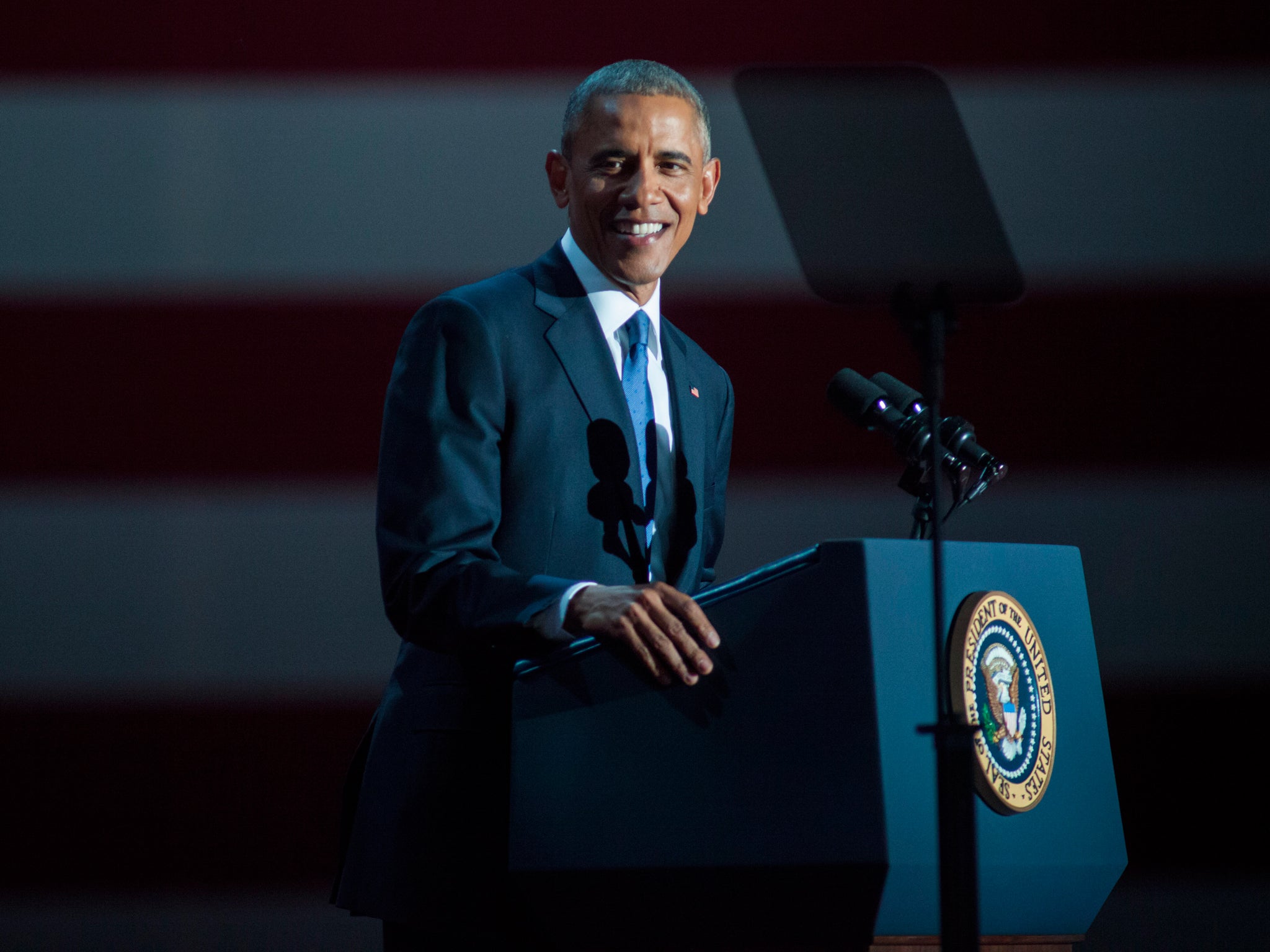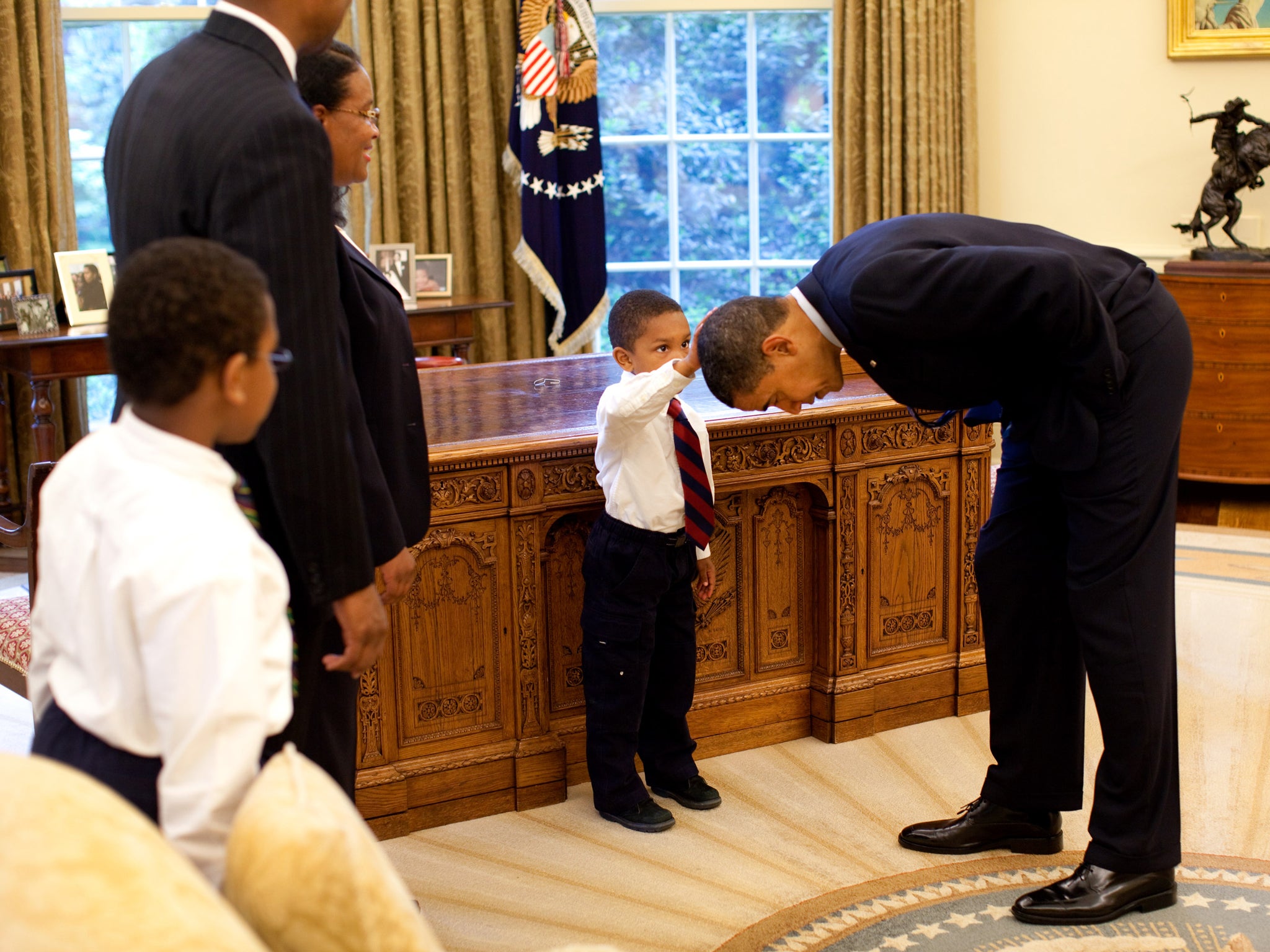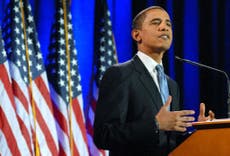The Independent's journalism is supported by our readers. When you purchase through links on our site, we may earn commission.
Electing Barack Obama, the first black President, did not absolve the US of its racist history
The President was assigned a task that was doomed from the start

I cried my first tears of joy when, one Tuesday night in 2008, Barack Obama took the stage of Grant Park in Chicago; he just won the election. I watched his speech from a bar in downtown San Francisco, as fellow patrons stared at the TV screens, stunned.
Never had I felt such a sense of simultaneous relief and satisfaction after the political theatrics of a presidential election. I had developed my political consciousness during the second Bush administration and, irrespective of the never-ending war and devastating economic collapse, began to believe that perhaps the country was not interested in moving in a progressive direction.
As a person of colour, Obama’s election gave me a reason to feel optimistic about the course of the nation when he became President-elect. He proved possible what people from minority communities could previously only imagine – never attain – as the barriers of white supremacy were still well intact. But in turn, the new President was assigned a task that was doomed from the start: that he, by virtue of being the first black man to occupy the White House Oval Office, would somehow absolve the United States of its racist history.
Even in his optimism – heroically maintained in the gloomy final days of his administration – President Obama conceded that, although “race relations are better than they were 10 or 20 or 30 years ago”, the hurdles of racism still have yet to be cleared.
“After my election there was talk of a post-racial America,” he said in his farewell speech earlier this month. “Such a vision, however well-intended, was never realistic. Race remains a potent and often divisive force in our society.”
It would have been naïve to think that one president could dismantle centuries of American white supremacy in only eight years. That’s simply not how history, let alone the US political system, works. And the moment Obama took office, he faced opposition from the stalwarts of that system in Congress – stymied by conservative-voting “Blue Dog” Democrats when he had a “supermajority”, and ultimately held by Republicans after the midterm election in 2014.
He was met with racist criticism and resistance from his campaign, when a Fox News commentator referred to a fistbump between Obama and now First Lady Michelle Obama as a “terrorist fist jab”. While speaking at a joint session of Congress, a white Republican congressman heckled the President, shouting “You lie!”, when he said his proposed healthcare reform legislation would not insure undocumented immigrants.
In my life, I had not witnessed that sort of treatment of a sitting President, and felt it was no coincidence that Obama, whose portrait stands in stark contrast to the 43 men before him, seemed to attract the boisterous protests of angry white elected officials.
Obama was restrained for much of his first term when it came to the topic of race. The administration did not want to appear to promote a “black agenda” so soon after taking office, White House insiders told The New York Times.
“At a minimum, that would have been tone deaf,” former Attorney General Eric Holder said, “and at worst, would have created a reaction in the larger community that would have prevented the things you wanted to do.”
However, that restraint would ultimately lead to disappointment for some during the Ferguson protests, when a white police officer shot and killed unarmed black teenager Michael Brown in August 2014.
In his statement in the wake of the massive demonstration and riots, sparked by the mobilisation of a heavily militarised local police force, quick to pull the triggers of their tear gas launchers, Obama tried to maintain a balanced tone that defended rights of the protesters to peacefully assemble while also maintaining support for law enforcement.
“There is never an excuse for violence against police or for those who would use this tragedy as a cover for vandalism or looting,” he said. “There’s also no excuse for police to use excessive force against peaceful protests or to throw protesters in jail for lawfully exercising their First Amendment rights.”
A Justice Department investigation, released in March 2015, found that “nearly every aspect of Ferguson’s law enforcement system” disproportionately impacted the African American community.
The mobilisation of activists in the wake of Ferguson prompted a national call for police reform, answered by the President’s executive action to launch the Task Force on 21st Century Policing. The task force promoted more community engagement from police departments, de-escalation training, and oversight. Of course, cities must voluntarily adopt the guidelines, and a majority of US cities have yet to implement such community policing strategies.
Obama made his progressive values clear in the numerous other executive actions he ordered throughout the latter half of his administration – as evidenced through Daca, which protected undocumented immigrants brought to the US as minors from threat of deportation; and the directive to allow transgender public school students to use bathrooms according to their gender identities.

But the significance of Obama lies in his experience as a person of colour in America – something literally no other president of the United States has had. While President, he first explicitly conveyed that connection, after a self-appointed neighbourhood watchman shot and killed 17-year-old Trayvon Martin as he walked home from a convenience store with a can of fruit juice and package of Skittles candy.
“If I had a son, he’d look like Trayvon,” Obama told reporters in 2012.
Two years later, weeks after Ferguson, Obama described his shared experience with young civil rights activists in an interview with BET.
“When they described their own personal experiences of having been stopped for no reason, or having generated suspicion because they were in a community that supposedly they didn’t belong, my mind went back to what it was like for me when I was 17, 18, 20,” Obama said.
“And as I told them, not only do I hear the pain and frustration of being subjected to that kind of constant suspicion, but part of the reason I got into politics was to figure out how I can bridge some of those gaps in understanding so that the larger country understands this is not just a black problem or a brown problem. This is an American problem.”
I first learned of that suspicion at the age of 11, when a police officer put me in a headlock after a white friend gave him a derogatory shout; the countless times Texas state police pulled me over while driving on country roads at night. To know that the President had walked down the street at some point in his life and fell victim to the same stereotypes that millions of black and brown Americans feared gave me some solace. It also served as a reminder that the country’s problems go way beyond one man, one administration.
“Racism, we are not cured of. And it’s not just a matter of it not being polite to say ‘n*****’ in public. That’s not a measure of whether racism still exists or not,” Obama told comedian Marc Maron on his podcast in 2015. “Societies don’t overnight completely erase everything that happened 200 to 300 years prior.”
For years, well before Barack Obama’s name would grab the attention of a young Latino from Texas, the concept of a president who wasn’t white seemed like an impossibility. “Not in our lifetime,” my 12th grade government teacher, a white man, told my classroom. He suggested that the US’s legacy of whiteness was too powerful still to elect somebody from outside of those constraints.
And still, persistent white supremacy in the US sparked a rabid backlash to the first black President – taking shape in gerrymandering to virtually rig elections in favour of state Republicans, racist voter identification laws that largely targeted black voters, the overt racism directed at Obama and the First Lady, and intimidation of Latino voters. All this resulted in a Republican stronghold of Congress, the majority of US statehouses, and a racist business mogul taking over the White House.
Despite this, Obama issued his optimistic call to action to people who wish to change the course of the US, to bend the proverbial arc toward justice.
“Show up, dive in, stay at it,” he said during his farewell, as he readies to leave office far more popular than the President-elect. “Sometimes you’ll win, sometimes you’ll lose. Presuming a reservoir in goodness, that can be a risk. And there will be times when the process will disappoint you.
“But for those of us fortunate enough to have been part of this one and to see it up close, let me tell you, it can energise and inspire. And more often than not, your faith in America and in Americans will be confirmed.
“Mine sure has been."



